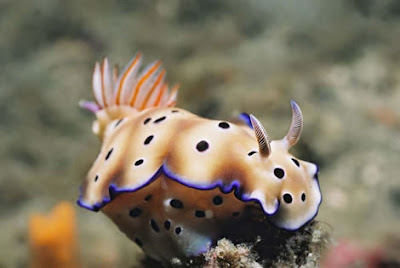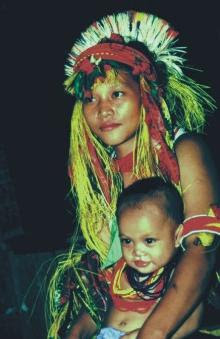





The Bunaken National Marine Park was formally established in 1991 and is among the first of Indonesia's growing system of marine parks. However, it was not until 2000 that the park began to get serious funding from the users, in order to be able to rezone and send out environmental patrols to move towards more sustainable conservation. The Park lies off shore from Manado, and covers a total surface area of 89,065 hectares, 97% of which is covered by sparkling clear, warm tropical water. The remaining 3% of the park is terrestrial, including the five islands of Bunaken, Manado Tua, Mantehage, Nain and Siladen.
All visitors to the Bunaken National Park (divers and non-divers) are required to pay an entrance fee, in accordance with North Sulawesi Provincial Government Provincial Law Number 9/2002. The entrance fee for foreign visitors is Rp 50,000 per daily ticket (approximately US$6), or Rp 150,000 (approximately US$17) for a waterproof plastic entrance tag valid for the full calendar year.
Entrance tags and tickets can be purchased direct from all NSWA members, or from ticket counters on Bunaken Island and on Siladen Island. They must be carried at all times that guests' are within the park boundaries, and tags can easily be affixed to guests' diving or snorkeling gear or on backpacks. Enforcement of the entrance fee system is conducted via spot checks by park rangers on land and at sea.
The entrance fee system has been adapted from the well-known Bonaire Marine Park system, and the proceeds from the sales of the entrance tags are managed by the Bunaken National Park Management Advisory Board (BNPMAB), a multi-stakeholder board that NSWA is a member of. The system was successful in rising over $130,000 for conservation programs in Bunaken during 2008.
All proceeds from sales of the entrance tags and tickets are managed by the Bunaken National Park Management Advisory Board (BNPMAB), a multistakeholder board established by Governor's decree No. 233/2000 and consisting of dive operators, environmental organizations, academia, pertinent government officials and villagers from within the park. The BNPMAB will utilize these funds to finance a number of high priority conservation programs in the park, including patrols and enforcement to abolish destructive fishing practices such as blast and cyanide fishing, village improvement programs within the park, collection and disposal of plastic and other wastes entering the park's waters, marine conservation education of village children and adults, and reef and mangrove rehabilitation.







Comments
Post a Comment